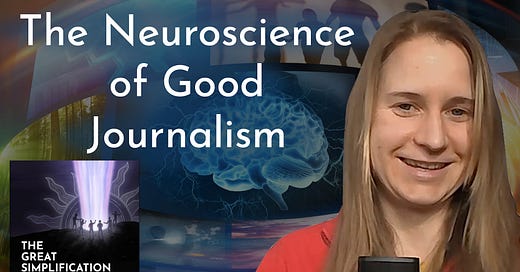The Neuroscience of Good Journalism: How Constructive Journalism Uses Information to Empower
The Great Simplification #174 with Maren Urner
The psychological effects of media consumption and keeping up with the 24-hour news cycle are vast. It can sometimes feel impossible to stay educated on current events without also feeling hopeless, disempowered, or even enraged. Worse, the incentives and structures of modern media outlets seem more and more geared towards capturing our attention at any cost… including our mental health, trust in one another, and even open societies themselves. Given this, is there a way to get back to a form of media and journalism that helps us feel empowered, and if so, how do we do it?
Today, I’m joined by neuroscientist and best-selling author, Maren Urner, to discuss the critical role of journalism in democracy, the importance of rebuilding trust in media, and how neuroscience can inform our understanding of media consumption. Maren makes the case for constructive journalism – a more balanced and solutions-oriented approach to reporting – as a powerful antidote to the relentlessly negative tone of traditional media. She also highlights the urgent need for systemic change in the way journalism operates if we want to foster a more informed and empowered public.
How do our deeply ingrained cognitive biases shape the way news is produced and consumed? Could journalism evolve to become a force for collective action and positive change, rather than just another profit-driven industry competing for our clicks? And in a world where our attention has become one of the most valuable – and contested – resources, how can we take greater ownership over the media we choose to engage with?
In case you missed it…
In last week’s Frankly, I dove into the theme of unintended consequences across energy, environmental issues, and social movements. Through this lens, we understand the importance of looking two or three steps ahead of today’s actions and see the - sometimes unwanted - ripple effects in the future.
If you appreciate The Great Simplification podcast…
Be sure to leave a review on your preferred podcast platform! Leaving reviews helps the podcast grow, which helps spread awareness of our systemic situation from experts in ecology, energy, policy, economics, technology, and community building so that we can better understand - and respond to - the challenges of the coming decade.
The Great Simplification podcast is produced by The Institute for the Study of Energy and Our Future (ISEOF), a 501(c)(3) organization. We want to keep all content completely free to view globally and without ads. If you’d like to support ISEOF and its content via donation, please use the link below.






Beautiful ideas. I'd like to see some examples of positive journalism that aren't full of big business greenwashing like buying an EV and choosing a "green" supplier on your energy utility, and also aren't the outdated miniature green tips like buying your veggies at the farmers market, Meatless Mondays, and which numbers of plastic can be recycled in your area. Something that encourages deeper life changes. Would Dougald Hine's podcast and substack be an example?
For me the best part was the line about being the driver of the bus that picks up all the people waiting for someone to come collect them and get ready to do something constructive.